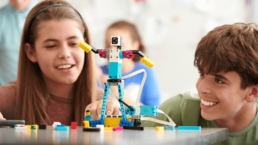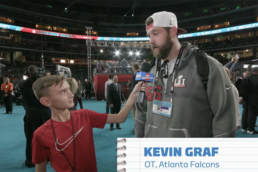Transforming kids content playground
The game-changer: deliver knowledge
From Tiktok to YouTube, younger generations are influenced by a diet of digital content at a very early age. Media companies are focusing to understand what kind of content is more attractive to this ‘Generation Z’. Getting an accurate track is challenging since the majority of content is consumed on smartphones, tablets, and game console devices that still are not included in the ratings. Besides guessing what content is ‘popular’ or successful, there’s also ad revenue decline. The question is how this will reflect on subscribers, new users, and customers in the long run.
Delivering innovation, and not as a buzzword, is more than tech, apps, or new marketing: is a mindset, on how we approach business and content. As a creative and designer, successful business is how can brands relate with audiences, but going a step forward in how we deliver knowledge. This is the real game-changer.
Educational content, the key to the future
Operators generally target families, becoming key drivers of on-demand offerings. Netflix is one of the largest providers of online children’s content through output agreements, but they produced (or acquired) their own content since Disney+ launched its powerhouse streaming, the same with HBOMax feeding from Cartoon Network lineup. Amazon and Discovery, same story. How can we keep up -and more important- be at the top of the game? One approach is to create a market, understand the market, and leverage products and services to its needs. More than revolutionary, it’s smart. The Danish family-owned business LEGO is a fantastic business example, from associating movie franchises and IP’s with its pint-sized heroes, games, movies, etc, to launching major educational programs and learning products in China, the US, and Europe. We need a LEGO Channel asap.
Inspiring children through creative play and learning
It’s not just about having fun, but also delivering purposeful, problem-solving narrative entertainment. Educators, artists, science experts, and creators need to assemble and inspire the next generation, now. This is one of the main drivers growing both business and quality for kids’ content and media.
A decade ago, The Jim Henson Company created Sid the Science Kid (2008), dedicated to teaching science to preschoolers. PBS and other networks saw the genius in the idea. Today, STEAM programs are a must in every serious school program, even popular programming for kids from three to thirteen relate to this. Fun and great STEAM programming have created a diverse and exciting universe of content to stimulate young imaginations and make all kids feel like they can play at being an inventor, engineer, scientist, or artist.
LEGO® Education SPIKE™ Prime student classes enable kids to develop stronger critical thinking and problem-solving skills
Educational entertainment: a bright future

Companies are in creating a new slate of children’s and YA content. Roku, Apple TV, Android TV, and Chromecast join the ranks of Netflix (MC2/Magic School Bus), Amazon (Annedroids/Creative Galaxy/Tumble Leaf), PBS (Sci Girls/Sid the Science Kid/DinoTrain), and Marvel TV with kids’ specific educational content aimed to engage fans building audience strategies for years to come. From integrated educational programs and award-winning content, companies created a whole series of solutions for younger students and help teachers to leverage and engage with their students. We need educational evolution to avoid mental extinction.
Streaming content like “Doozers” (Hulu), focus on “design teaching” based on engineering and design, fantastic machines using recycled resources. Playing creates a perfect opportunity for kids (and adults) to become active, collaborative learners and have fun. Annedroids (Amazon) Its also very much connected to STEAM curricula. Kid-scientist Anne has invented and built her own amazing androids in her backyard lab and enlisted the help of other kids in the neighborhood.
Xbox, more than games
Even Xbox users already spend more time watching video than playing games with the device and heavyweights like Nickelodeon, Hulu and Dailymotion are partnering to create another avenue to connect with their audiences. Tiktok is pushing to bring premium content and live streaming services to sell advertising packages, and even Disney and Saban invested in a viral content platform “Playbuzz” to create and distribute content into social media outlets.
Also, the NFL and the MLB are going after young audiences, encouraging their stars to reach out to fans via Twitter, Instagram, and Snapchat. The focus is to motivate youngsters who are not watching football or baseball on TV (but spending hours on digital) to watch streaming matches online and on mobile. NBCU made a savvy move announcing a consolidated upfront selling advertising across platforms and marketers are targeting interrelated audiences.

Xbox delivers a solid interface featuring all entertainment in one place, from games to favorite streaming, apps and the latest movies.

Sports Illustrated Kids interviews Patriots and Falcons at Super Bowl LI media day in Houston.
These initiatives serve both content and business. The result is much more efficient kids content, generating deeper engagement, and building revenue streams outside the traditional media universe.
Today is the streaming revolution, tomorrow maybe be something else, but innovation will always be the constant. Is the ability to transform the business and identify what plays the best. A thought from Viktor Frankl comes to my mind: “When we are no longer able to change a situation, we are challenged to change ourselves”.
Creating tomorrow for the next generation
What kind of resources are we providing today so the next generation can make the right decisions, develop leading skills and choose the right opportunities for them in a world overloaded with choices and information. The key starts with the right mindset and the best set of tools, both intellectual and emotional. Let's dive in...
Recalculating your thoughts
We value intelligence, personality, and character. But what is it? Luck, chance, genetic predisposition? Some believe success is based on natural abilities, others, on learning those abilities, or even the circumstances you were born. But identity and how we define ourselves are the building blocks of our future. This can change everything. What we ‘think’ of ourselves is who we think we are, and our conscious and unconscious thoughts affect our decisions, especially at work, in our careers, and in the direction of our future. Doesn’t matter if you are 7 or 47, those beliefs and mindsets will guide your steps.
We all have different situations, but those conditions are not set or final, they are a starting point. And that’s where your ‘mindset’ comes in handy. What we think and believe of ourselves is what’s happening: where you are right now is a result of that.
Changing your beliefs can have a powerful impact on your mindset. Imagine if you could “recalculate” our destination, and how we relate to others, and make decisions -career or personal ones-. Commonly, a “mindset” is associated with entrepreneurs. And that’s correct, but it’s just the tip of the iceberg. Learning, overcoming, trying. Imagine what would happen if you think of failure as a learning opportunity?
Our focus should be on inspiring kids to develop their own abilities, confidence, and possibilities so they can find their own mission, understand value, and whatever success means for them. And even in the most adverse conditions or failures, kids (and adults) will be able to find their way and purpose.

More than skill, its a vision
Building a mindset is more related to ‘purpose’ than to a set of skills. Mindset is simply a belief system. It’s an attitude, disposition or tendency that a person adopts to respond to challenges, tasks, and opportunities. An entrepreneurial attitude is at its core level, resolving a problem by working out a solution. A mind is inspired by belief, that inspires others. Confident and positive, creative, resourceful, and resilient, capable of distilling concepts and ideas into actions and decisions, generating momentum and an atmosphere for things to happen. An entrepreneurial mindset goes beyond creating a business or a start-up, an entrepreneurial person is someone who terraforms their environment, decisions, and actions into creating its own future and drives cultural changes, from one family to an entire nation, to one succesful product to a lifestyle revolution.

Learned skills or natural traits?
Some people look at change and see opportunity, others look at problems and see solutions. Why is that? Some, when challenged, rise above, while others paralyze by doubts and indecision. Although we are all born with a specific set of genes, with no control over our genetic allocation, we know lifestyle choices and different experiences through development and maturity can influence gene expression and thus exert influences over behavior.
Everyday experiences instill the “entrepreneurial” mindset, beginning within our family, and later when we go to school, college, the friends we have, and finally at the workplace. The sooner you start to understand and use these traits, it becomes a habit.
While entrepreneurship skills can be learned, and become a successful business entrepreneur, a classroom environment has its limits. Inspiring a mindset is a hands-on process, especially when you focus on leadership (and team development). Entrepreneurial instincts are naturally incorporated at home, by family members or observing other people, even friends. They may not use MBA or Masters terms, but they do understand the actions that matter to achieve success. And it focuses not only on their personal success but on helping others to reach their success.
Where do we start?
The first step is to do a bit of “spring cleaning’, let some fresh air into the mind. Take a moment to look at your ‘mindset’ and visualize it. Are you aware of your abilities? how do you perceive your value? What do you love to do (having an ice-cream sandwich doesn’t count… unless you are planning to develop an Ice cream empire, you see, a passion can become a skill). Normally we connect the term “successful mindset” with entrepreneurs, but there’s so much more.
Strengthen confidence and trust in your abilities will boost your decision-making skills, your learning skills, and your time management. Imagine having more time to improve something you like or do something completely new. The simplest change in your mindset can have a profound impact on every aspect of your life. Imagine if you could “recalculate” your direction? From the way relate to others, the way you make decisions, career or romantic ones.
Practical application: if you feel brave enough, write down a list of your skills -even if it sounds small or unimportant- You might discover hidden or untapped skills. Write also what you are good at, and what you’ll like to improve. Also, exercise looking around. Focus on small situations and things that are important to you. Successful moments, mistakes…what is worthy to repeat and what to do differently. Understanding the value you could bring to your situation is the springboard to your future. Even if is a small thing, the payoff is giant. It will literally change the course of your actions. Learning, overcoming, expanding your tent. Imagine what would happen if you think of failure as a learning opportunity? or an obstacle as a chance for developing skills. The sky is the limit.
Creating an entrepreneurial mindset means inspiring people to believe in themselves and to dream big about what their future could be. It’s guiding people, teams and organizations to see the potential in ideas and situations, both individually or part of a group or community. Its creating a future.

